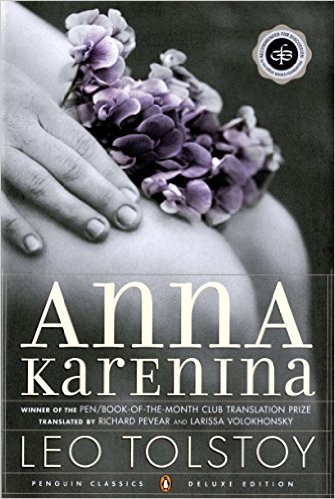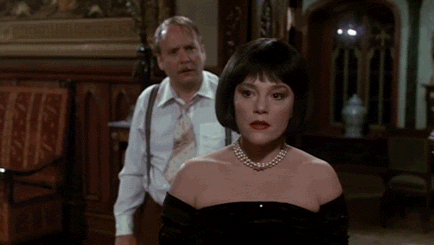I spent an entire year of my life on this sucker and I feel like I owe it to myself, at least, to explain why this book irritated me so much. Part of it was that the book was sold as a feminist novel. Maybe I was asking too much of this book; maybe I made the mistake of relying on the packaging and not on the product itself. I mean, we live in a universe where this cover exists for Anna Karenina.

Guess what’s in Anna Karenina? Utopian Russian farming. Guess what’s not in Anna Karenina? Sexy knees.
But I digress. If a book calls itself “feminist,” I kind of expect that the ladies are going to be treated well as characters. The women are going to make choices, and these choices are going to have some sort of moral grounding (I don’t mean they adhere to any sort of moral framework, I mean that their actions have consequences, instead of the women all being Little Ladies whose main function is to look on at events and occasionally be rescued.) Also, maybe this is a personal preference in my feminism, but I don’t expect a feminist book to focus too much on the female lead’s personal appearance unless it makes sense.
The thing is, there are plenty of situations where focusing on a woman’s appearance makes sense. Everybody would rather be pretty than ugly, and women are forced to depend on their attractiveness in patriarchal societies, and low self-esteem about appearance is pretty common for YA heroines (it’s usually cured by the love of a hot vampire/werewolf/I don’t know, golem).
And this is a sort-of YA novel, after all: Johansen uses the exact same plotline as every other YA novel, where the heroine has trouble (or thinks she’ll have trouble) attracting the hottest guys because she’s so plain and powerless. Oh, except Johansen “subverts” the hot, dangerous older man falling in obsessive love with the “plain” young protagonist plotline by having the older man reject and insult the heroine, over and over. Because the problem with stuff like Twilight and 50 Shades of Grey is that the heroes have too much respect for the heroines. Oy.
The other problem, apart from the constant belittling of the heroine, is that Johansen takes female beauty and the accompanying low self-esteem storyline and harps on it for the entire book, despite having managed to create the one narrative situation where this trope is wildly inappropriate. Kelsea leads a dirt-poor society in which the vast majority of people are serfs. They’re probably prematurely aged from nutrient deficiencies, diseases, and the horrors of war. We know that most of them can’t read, and they don’t have posters or illustrations or photographs to instruct them on any particular beauty standard. Their lives are hellish, but the one cynical advantage that Kelsea has is that peasants are going to be impressed by her appearance because she’s not crippled and covered in an inch-think layer of shit. None of them are going to think she’s fat or snark on her brow game.
But what about Kelsea’s peers? Well, technically, she doesn’t really have peers. Kelsea is an absolute ruler, and that level of power tends to make people more attractive. Granted, these people are more often men than women, but when a women manages to hold a position of high power, they can take advantage of it in just the same way. Look at Catherine the Great! Why do you think she died fucking a horse? It’s because she wore out all the people!*
Also, Kelsea is also an absolute ruler in a society in which power can descend through the female line. That means that whoever Kelsea chooses as her babydaddy—and it really could be anyone, considering that no one even knows who Kelsea’s father is—might be the father of the next ruler of the Tear. Kelsea could, like, not have a face and guys would still be throwing themselves at her.
So, whatever she actually looks like, Kelsea would treated as the hottest person in the kingdom and have her choice of lovers. That’s not to say that she would necessarily get a happily ever after, or even a happily for now—her situation is ripe for exploitation, especially because she’s so sheltered. But it’s highly unlikely that she would be insulted or rejected when men (and women!) have every incentive to find her attractive.
Instead, I read through page after page of men putting Kelsea down and Kelsea worrying about being too fat for her armor, along with a lot of animosity toward women who try to make themselves attractive. This is a book where everybody lives in a sick neofeudalist system, yet the only person in this horribly unjust system who is outright condemned is an older woman who has altered her face, cause, you know, we wouldn’t know serfdom was evil if some old nasty bitches weren’t involved.
I don’t know why Johansen didn’t play with the concept of absolute power and how that affects attraction. Maybe she thinks that a heroine who considers herself attractive, or just doesn’t prioritize her appearance, is unsympathetic. Or maybe she’s just a terrible worldbuilder. Or maybe a book isn’t “feminist” unless the heroine gets crapped on at regular intervals. (Seriously, how do you think that “oh, everyone really does think the heroine is ugly and treats her like shit even though she has powers of life and death” is an improvement over, say, Twilight?)
* Catherine the Great did not really die having sex with a horse. She did, however, have a penis table.
